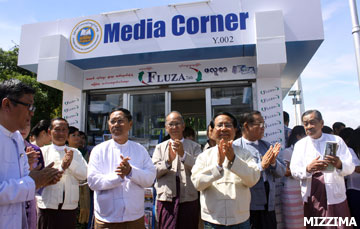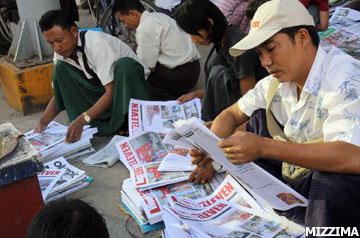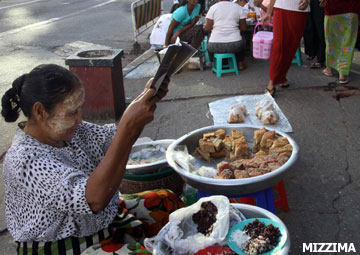Chiang Mai (Mizzima) – As World Press Freedom Day is marked around the world, journalists claim Burma’s new government has not ushered in freedom of the press but superficial change is in the air.

In 1991, the United Nations declared May 3 as World Press Freedom Day to raise awareness about press freedom and remind all governments about the need for a free press.
Over the decades, Burma has suffered from strict censorship. But under the new government of President Thein Sein, the Press Scrutiny and Registration Division (PSRD) under the Information Ministry recently lifted censorship of some journals and eased their tight control over media coverage of certain subjects.
The Burmese authorities allow the publishing of private weekly journals but not private daily newspapers. All private journals have to pass articles through a censorship board led by military officers prior to publication. But as an experienced editor of a private journal told Mizzima, there has recently been a slight relaxation of censorship.
Earlier, the board imposed strict censorship on news and articles that included criticism of the education and health care systems, and the problems faced by farmers. Now, the board has eased up a little.
‘Currently, we can use screaming headlines’, the editor said. ‘It’s been a long time since the censor board warned and ordered the editors to sign pledges. So, we feel relatively comfortable. The change is really obvious’.
Earlier, many reporters were routinely picked up and interrogated for taking news photographs. Now, taking news photographs and conducting interviews are relatively free, according to the editor.
Not everyone agrees. Another editor Mizzima talked to said there has been no signal for a free press.
‘We still do not have freedom of press’, he said. When journalists collected information from government ministries last month, they faced strict restrictions.
‘There is no obvious change. Change may occur gradually’, the editor said.
 Few are old enough to remember a free press. After General Ne Win seized power in a coup in 1962, the Printers and Publishers Registration Law was imposed, coupled with censorship laws enacted during the British colonial. These laws are still in effect.
Few are old enough to remember a free press. After General Ne Win seized power in a coup in 1962, the Printers and Publishers Registration Law was imposed, coupled with censorship laws enacted during the British colonial. These laws are still in effect.
A recent report compiled by the US democracy and rights watchdog Freedom House said that Burma remained on the list of the 10 worst countries for violating media freedom, near North Korea at the bottom. At least 17 journalists were in prison in Burma at the end of 2010, according to Freedom House. Most of them were charged under the Electronics Act, The Printers and Publishers Registration Law, The Emergency Provision Act and The State Protection Act.
Journalists in Burma have to work under difficult circumstances and have to act with care if they are not to fall foul of the draconian laws.
Just after pro-democracy leader Suu Kyi was released from house arrest at the end of 2010, news about her was allowed to be published in local journals, but later news on her actions was effectively banned.
Only last week, the censor board allowed some journals to publish photos of Aung San Suu Kyi at a ceremony to mark the 10th anniversary of the Free Funeral Service Society led by former actor, Kyaw Thu. But, the name of Kyaw Thu was not allowed to be mentioned in the news.
For published news on the serious outbreak of Porcine Reproductive and Respiratory Syndrome, which had been already reported by state-run newspapers, journalists did not need approval, but for news about border trade and import and export, journalists need approval from the Commerce Ministry.
‘Although there is no threat to journalists, editorial teams need to sign a pledge if something is allegedly wrong. Anyway, the number of those cases is less than before. In fact, this is the result of journalists’ utmost caution’, one editor told Mizzima.
When reporters conduct interviews with government officials, they need to show the transcripts to the officials and seek approval from them prior to submitting the stories to the censor board.
When we conduct interview with the officials, they used to talk freely. But, when we show the transcripts to them, sometimes they want to modify them’, said one editor.
If a journal publishes an article that does not get the clearance of the censor board, the authorities often threaten the editors, and the editors need to sign pledges. Then the journal will be suspended for at least two weeks.
Political subjects are difficult to report on. In 2007, when the Saffron Revolution occurred in Burma as a result of a fuel price hike, the news was not allowed to be published in local journals, according to an editor. Restrictions were also tight over what could be reported before, during and after the 2010 election.
On the other hand, a reporter said that over the last three months, they did not need to seek approval from government ministries if the sources were reliable.
The PSRD director, Tint Swe, told Flower News Journal that the new government would relax the censorship in accordance with the constitution.
 Although the authorities recently said that publications focusing on sport, entertainment, general knowledge, health, children’s literature, the supernatural and technology do not need to submit stories to the censor board, they still have had to submit them so far.
Although the authorities recently said that publications focusing on sport, entertainment, general knowledge, health, children’s literature, the supernatural and technology do not need to submit stories to the censor board, they still have had to submit them so far.
Since early 2011, the censor board lifted restrictions on the publication of some important news, which can be useful for people, according to another editor. He told Mizzima that this was very obvious in April.
‘As a local journalist, the current situation is not bad. But, there are still restrictions because we still have a censor board. So, we cannot enjoy complete freedom of the press. But, we can see a little improvement’, the editor said.
Another editor said that although the censor board lifted some restrictions on the local journals, the overseas Burmese news agencies would not decline in importance because the local journals still need to present manuscripts to the censor board and that caused a delay in the reporting processes.
‘Often, the overseas news agencies can publish a scoop before the local journals because we need to pass the censor board. In my opinion, some restrictions on local journals have been lifted because the new government wants to show some changes’, the editor said.
The process is laboured. The manuscripts must be saved as PDF files and then the PDF files and four hard copies of the manuscripts need to be submitted to the censor board. About three days after the copies have been submitted, the publication can be published, an editor said.
‘A member of staff from the censor board will say which pages need to be removed or sources need to be mentioned in some news. Then, the local journal needs to modify the manuscripts in accordance with the censor board’s instructions. Then, the front cover needs to be submitted to the censor board again. At that time, we don’t need to submit the contents of other pages. Then we need to wait three days’.
The censor board is just one of the challenges faced by journalists in Burma.
Some journalists have been imprisoned for reporting for overseas news agencies. And some have been imprisoned for their alleged political actions.
Hla Hla Win and Ngwe Soe Lin from the Norway-based Democratic Voice of Burma have been sentenced to 27 years and 13 years in prison respectively under The Electronics Act, The Video Act and The Emergency Provision Act.
Although the new President Thein Sein said in his presidential acceptance speech that the media is very important in a democratic country, Burma still has many restrictions on the media.
Reporters and editors that Mizzima talked to said they could see some changes, but that it is too early to judge the new government because it only came to power a month ago.
One female journalist said, ‘We will neither criticize the political system nor the government leaders. But, if we can freely give opinions about the education system, the health care system and other important things, it would be good’.
She said that only if there is no censor board could they talk about press freedom.
But, she said, ‘We can do better than before and difficulties have decreased in number because the censor board has lifted some restrictions’.
When it comes to press freedom, no Burmese journalists are holding their breath, but there is some hope that certain restrictions will ease.



